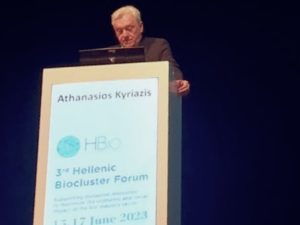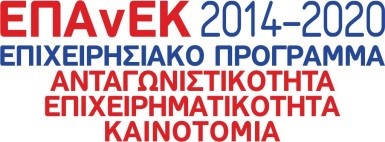On Tuesday, June 13, the Secretary General for Research and Innovation, Mr. Athanasios Kyriazis, participated in the 3rd Hellenic BioCluster (HBio) Forum on “Supporting disruptive innovation to maximize the economic and social impact of the bio-industry sector”, which was held at the Megaron Athens Concert Hall.
In his address, Mr. Kyriazis underlined that strengthening the links between Research & Innovation and entrepreneurship is a priority for the GSRI. He pointed out that, although research funding continues to account for a rather small percentage of the GPD, these last years it has significantly increased to reach 1.51% of the GDP in 2021, according to National Documentation Center data; at the same time Greece was the country with the biggest rank improvement on the European innovation scoreboard during the 2015-2022 period.
He added that life and health sciences are among the fields where academic research, both basic and applied, boasts impressive results, and that innovation in medical scientific research is today a cornerstone of the so-called 4th Industrial Revolution and an essential condition for economic development and for improving quality of life.
He subsequently indicated that the GSRI actively supports research & innovation in the health sector, through various actions, and that it will continue to do so, mainly under the new 2021-2027 programming period Research and Innovation Strategies for Smart Specialization (RIS3).
More specifically, he mentioned the new NSRF 2021-2027 “Research-Innovate” single action that has earmarked 59 million euros for the “Biosciences-Health-Pharmaceuticals” sector, the biggest allocation among all priority areas – with total public funding amounting to 300 million euros for all 8 RIS3 thematic priority areas.
Finally, Mr. Kyriazis mentioned the clawback regime, which has received 250 million euros from the Recovery and Resilience Facility, as well as the two new bioscience-related institutes, i.e. the Greek Institute of Human Genomics (GIHG) and the Biomedical Research Institute (BRI), both at the Foundation for Research and Technology-Hellas (FORTH), and concluded by saying that the new 2021-2027 Programming Period offers even better opportunities for investments in research and technology, through financing provided by the European Structural and Investment Funds.


















